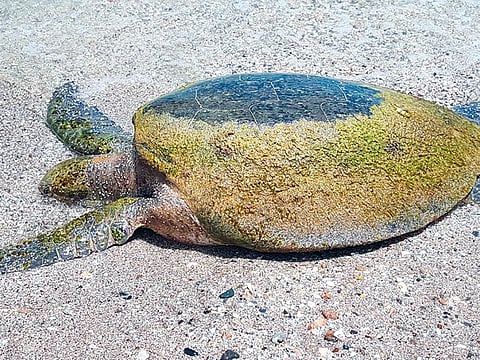Green turtles dying after ingesting plastic, says study
EPAA research finds that marine debris poses a threat to the region’s green sea turtles

Sharjah: Plastic waste is posing a major threat to green sea turtles on the eastern coast of the UAE, as a recent study found that 86 per cent of the turtles had ingested marine debris, primarily plastics.
The research was conducted by Sharjah’s Environment and Protected Areas Authority’s (EPAA) Scientific Research Department and Breeding Centre for Endangered Arabian Wildlife.
The EPAA studied and classified the marine debris ingested by green sea turtles on the Eastern Coast, with their findings suggesting that it’s a serious threat to these creatures in this region.
The researchers examined 14 stranded green sea turtles from the Gulf of Oman; all of the turtles examined were dead.
According to the EPAA research, 86 per cent of the turtles had ingested marine debris, mainly plastics. The debris included ropes, fabric, cotton buds, woven and regular plastic bags, fishing lines, hooks, nets and traps.
The majority of the ingested debris were white or transparent; sea turtles may mistake white or transparent plastic for jellyfish.
The findings suggest a potentially high level of interaction between green sea turtles and debris along the Gulf of Oman coast of the UAE. The latter’s harmful effects on sea turtles are well documented in international studies.
EPAA chairperson Hana Saif Al Suwaidi said: “This study, one of the only studies in the region to focus on the ingestion of marine debris by sea turtles, is very important because the green turtle (Chelonia mydas) is endangered. EPAA will intensify its research efforts in order to identify and manage substances that disrupt our ecosystems. Research is just one of the many ways in which EPAA promotes environmental protection and raises awareness.”
An article describing the study and its findings will be published in the October issue of Marine Pollution Bulletin, the international journal for marine environmental scientists, engineers, administrators, politicians and lawyers.
According to Al Suwaidi, the EPAA’s Scientific Research Department, which is also investigating other threats to marine turtles, will expand this study to include the Arabian Gulf and other species of turtles.
Al Suwaidi urged the public to help protect and preserve the environment for future generations, by recycling and disposing of waste materials responsibly.
Sign up for the Daily Briefing
Get the latest news and updates straight to your inbox



